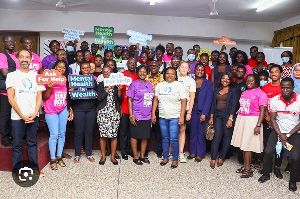The current state of the economy in Ghana is a challenging one, with several macroeconomic indicators showing negative trends. The country has been experiencing high inflation, with the rate reaching 45% in recent times.
This high inflation rate makes it difficult for individuals and households to maintain their purchasing power, as the cost of goods and services increases rapidly.
Additionally, the depreciation of the cedi against major currencies such as the US dollar has been significant. Between September 2022 and April 2023, the cedi depreciated by over 50%, making imports more expensive and further fueling inflation. Furthermore, the country's economic growth has been projected to be a meager 1.3%, which is insufficient to keep up with the population growth rate.
These macroeconomic indicators have significant implications for the standard of living of Ghanaians. With the cost of living increasing due to high inflation and a weakening currency, households have to contend with higher prices for basic goods and services, including food, rent, and healthcare.
This situation can be particularly difficult for those on fixed incomes or those whose incomes have not kept up with the rising cost of living. The low economic growth rate also means that there are limited employment opportunities, further exacerbating the situation for many Ghanaians.
In such times of economic crises and high cost of living, it is essential for individuals to be proactive about their personal finances. This may involve taking steps to manage expenses, such as creating a budget and prioritizing needs over wants.
It may also require seeking alternative sources of income, such as starting a side hustle or pursuing additional education or training to increase employability. Saving and investing can also help to mitigate the impact of inflation on personal finances over the long term.
1. Create a budget: A budget helps to keep track of your expenses and income. It can help you to identify areas where you can cut back on spending and save more money. In times of economic crises, creating a budget can help you to prioritize essential expenses such as food, housing, and healthcare.
2. Diversify your income sources: Relying on a single source of income is risky, especially during an economic crisis. Consider taking on a part-time job or starting a side business to supplement your primary income. This can help to spread your risk and provide a cushion in case you lose your primary source of income.
3. Build an emergency fund: An emergency fund is a savings account that is specifically set aside to cover unexpected expenses such as medical bills, car repairs, or job loss. Ideally, you should aim to have three to six months’ worth of living expenses in your emergency fund.
4. Reduce debt: High inflation and economic crises often result in higher interest rates and fees on loans and credit cards. Paying off debts as quickly as possible can help to reduce the impact of these higher costs on your finances.
5. Invest wisely: Investing in assets such as stocks, bonds, and real estate can help to protect your wealth against inflation. However, it's important to do your research and seek professional advice before investing to minimize the risk of losing your money.
6. Adopt cost-saving measures: During times of high cost of living, it's important to find ways to cut back on expenses without sacrificing quality of life. This could include carpooling, cooking at home instead of eating out, and buying in bulk.
7. Take advantage of government programs: During times of economic crises, the government may introduce support programs such as job training, subsidies, and financial assistance through initiatives such as the Ghana Care Program. If you are eligible, take advantage of these programs to help ease some of the financial burden.
In conclusion, it is important for individuals and families to be proactive and take steps to mitigate the impact of economic crises and high cost of living.
This includes having a clear understanding of their financial situation, creating a budget, prioritizing expenses, exploring alternative income streams, and seeking out resources and support.
While these challenges can be daunting, with the right strategies and mindset, it is possible to navigate them successfully and maintain a stable and fulfilling standard of living.
General News of Tuesday, 9 May 2023
Source: Korsi Dzokoto, Contributor

















